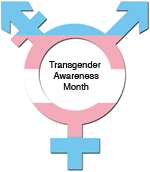 Existing nondiscrimination policies covering public transportation already include protections for transgender people, according to a statement issued Monday, Nov. 9, by the federal Department of Public Transportation, at the request of Dallas’ Trans Pride Initiative.
Existing nondiscrimination policies covering public transportation already include protections for transgender people, according to a statement issued Monday, Nov. 9, by the federal Department of Public Transportation, at the request of Dallas’ Trans Pride Initiative.
The policy “including a prohibition against discrimination based on sex can be interpreted as being inclusive of gender-identity discrimination,” the statement from the DOT’s Office of Civil Rights noted.
The statement points out that the nondiscrimination policy is referenced in the Federal Transit Authority “Master Agreement,” and that, “We will clarify that gender-identity discrimination is included in the ban on sex discrimination in our fiscal year 2016 Master Agreement.”
Nell Gaither, president of Trans Pride Initiative, said DOT issued the statement after her organization and Resource Center submitted a joint inquiry seeking clarification in June, as part of their efforts to help a Dallas trans woman who had encountered discrimination from employees in the Dallas public transportation system.
The woman “had been harassed, being called ‘sir’ and ‘mister’ in order to publicly out her” after she showed her state identification, Gaither said. “That’s not only harassment, it can her safety and her life in danger.”
Gaither said that although the woman had tried to resolve the situation by talking with transit staff, but had been unable to have the problem resolved.
“On the contrary, staff were victim blaming,” Gaither said. “At one point, a manager reviewing the issue stated that the trans woman was ‘confusing [the person who harassed her] by not getting her ID changed.’ That’s not an appropriate response.”
Gaither said that in the process of researching options to get the matter resolved, she learned about the DOT’s nationwide Master Agreement. Rafael McDonnell, communications and advocacy manager for Resource Center, was at the same time looking into an incident in which a gay man had been harassed by public transit staff, and McDonnell suggested TPI and the Resource Center submit a joint request to FTA officials asking for clarification.
The joint request, submitted June 12, also asked that the Federal Transit Authority modify the Master Agreement to include specific protections based on sexual orientation as well as gender identity.
The statement issued Monday only addresses gender identity, possibly because case law around sex discrimination as it applies to sexual orientation is less clear, Gaither said. Federal policy makers may see tying these to well-established sex discrimination coverage as a better solution than adding enumerated protected classes to the policy.
“We will continue to advocate for sexual orientation protections to be specifically added, but we certainly think [the] announcement is worth celebrating,” she said.
Gaither said that anti-trans discrimination has long been a problem in public transportation, and that such discrimination has a disproportionately large impact on low-income people who often depend on public transportation to get where they need to go.
“We are certainly happy to see this clarification, and we call on our communities and advocates around the nation to make sure public transit systems are held accountable for similar discriminatory actions moving forward,” she said.













